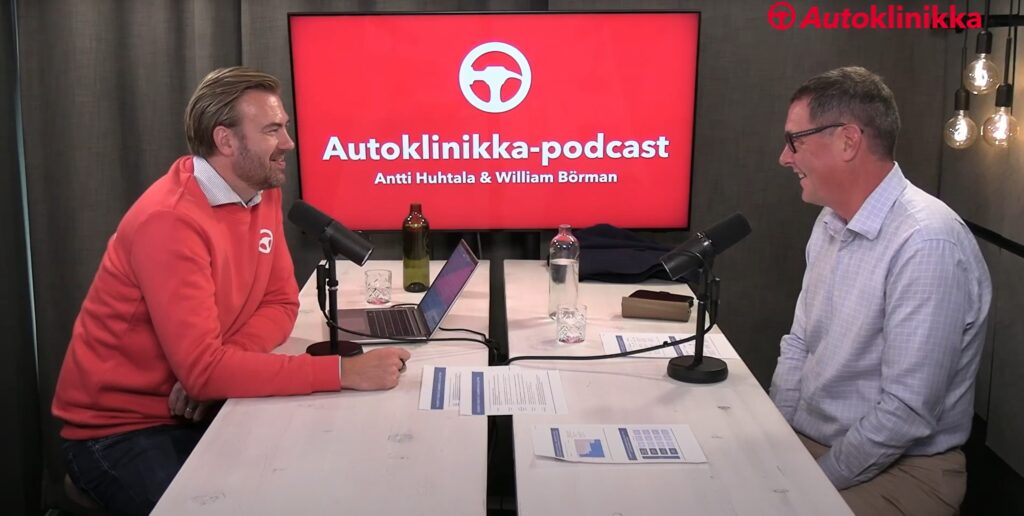In the latest episode of Autoklinikka’s podcast, finance and insurance expert Juha Viljakainen from VALOR Partners discusses the transformation of car sales and its impact on car insurance and financing.
The automotive industry is undergoing a significant transformation, with digitalisation and environmental concerns strongly influencing the mobility ecosystem. The Autoklinikka podcast provides insights from industry experts on future trends.
In episode #13, management consultant Juha Viljakainen from VALOR Partners, who has extensive experience in the finance and insurance industries and conducts in-depth research on the transformation of the car trade, discusses with Autoklinikka’s William Börman how new mobility services and the platform economy are affecting financial services related to the automotive industry.
According to Viljakainen, two major trends in the society are shaping the automotive and mobility services: digitalisation and sustainability. Additionally, electrification is becoming increasingly prominent within the automotive industry.
“From a business perspective, digitalisation means that every player must leverage the opportunities offered by technology, such as online services and mobile applications at the customer interface, or the implementation of artificial intelligence in internal processes,” Viljakainen explains.
Beyond these changes, digitalisation is also having a broader impact on service value chains. For instance, digital services are rapidly transforming service distribution.
“The platform economy plays a fundamental role, with digital marketplaces connecting various industries, such as car sales, financing, and insurance,” Viljakainen says.
“Traditionally, financial sector players have offered comprehensive services to both existing and new customers. Now, digital marketplaces are stepping between the customer and the financial company. The same trend is emerging in car sales.”
The purchasing process moves online
Twenty years ago, customers visited car dealerships to view and purchase cars. Today, the purchasing process takes place online or through mobile apps. In the automotive industry, Tesla has been a pioneer, while examples in other sectors include Amazon, Temu as a recent addition, and other Chinese e-commerce platforms.
“Physical stores now serve primarily as ‘fitting rooms’, where customers can see and touch the car, but the purchasing process is increasingly conducted digitally. This reflects the broader transformation occurring in commerce,” Viljakainen notes.
The platform economy has also changed mobility services. There are now options such as electric scooters, Uber ride-hailing, car-sharing services, and other subscription-based alternatives.
“All of these services have a strong link to digitalisation, as they rely on mobile applications, data tracking, and online-based processes.”
Although the concept of shared cars has not succeeded as well in Finland as elsewhere, other vehicle-sharing services, such as boat rentals through Skipperi or van rentals, have been more successful.
“In Finland, long distances and a smaller population make it more challenging to achieve scale,” Viljakainen reflects.

Environmental values favour electrification
City bikes, on the other hand, have been a success, and the business of employer-sponsored bikes has grown rapidly. Digitalisation and ease of distribution are converging with the rise of sustainability culture and environmental values.
Viljakainen believes that the electrification of the car fleet will continue strongly in new car sales, given the significant environmental pressures. Traditional car manufacturers are introducing models that offer alternatives to internal combustion engines, while the rise of new players, such as Chinese electric vehicle manufacturers, is also connected to international trade policies.
“However, the car trade has always been global,” he points out. “Most of the cars in Finland are manufactured abroad, even though retail has remained local.”
Changes are also visible in aftermarket services. For instance, the market for spare parts and maintenance services is consolidating. Additionally, foreign chains focusing on logistics have entered the market. At the same time, the electrification of the vehicle fleet is driving repair shops to invest in new technologies and develop new expertise.
Financial services sales channels are evolving
The transformation is also affecting vehicle financial services and where financing and insurance products are sold.
“When insurance is purchased on a digital marketplace alongside the car, how can an insurance company influence the decision on where the insurance is bought? For example, in subscription-based services, insurance is often handled by the leasing company, shifting the consumer market towards the B2B market,” Viljakainen highlights.
According to Viljakainen, insurance companies must be present across multiple distribution channels and develop their products in innovative ways, as the range of options has expanded significantly. Moreover, the shift toward electrification has increased the need for insurance companies to better understand the repair processes of electric vehicles, as repair costs have risen.
He adds that the transformation of car sales has emphasised the role of importers. Nordic importers are increasingly seeking partnerships across the region, which could mean that brand-specific insurance products may be offered by companies outside of Finland.
“This represents a clear strategic threat to the Finnish players,” Viljakainen warns. “With the added pressure of international competition and global financial industry players, it is clear that the need to stay in the game in new ways has grown significantly.”
Listen to the full episode (in Finnish) at:
Text: Catarina Stewen
